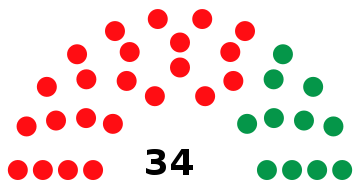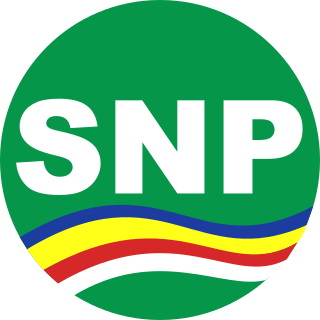
 |
|---|
Parliamentary elections were held in Seychelles between 10 and 12 May 2007. [1] The result was a landslide victory for the ruling Seychelles People's Progressive Front, which retained all 23 of its seats in the 34-seat National Assembly.

 |
|---|
Parliamentary elections were held in Seychelles between 10 and 12 May 2007. [1] The result was a landslide victory for the ruling Seychelles People's Progressive Front, which retained all 23 of its seats in the 34-seat National Assembly.
 | ||||||||
|---|---|---|---|---|---|---|---|---|
| Party | Votes | % | Seats | |||||
| FPTP | PR | Total | +/– | |||||
| Seychelles People's Progressive Front | 30,571 | 56.16 | 18 | 5 | 23 | 0 | ||
| SNP–SDP | 23,869 | 43.84 | 7 | 4 | 11 | 0 | ||
| Total | 54,440 | 100.00 | 25 | 9 | 34 | 0 | ||
| Valid votes | 54,434 | 97.50 | ||||||
| Invalid/blank votes | 1,393 | 2.50 | ||||||
| Total votes | 55,827 | 100.00 | ||||||
| Registered voters/turnout | 64,993 | 85.90 | ||||||
| Source: African Elections Database [lower-alpha 1] | ||||||||

The politics of Seychelles have historical roots in both one-party socialism and autocratic rule. Following independence from the United Kingdom in 1976, Seychelles was a sovereign republic until 1977, when the original President and leader of the Seychelles Democratic Party, James Mancham, was overthrown in a bloodless coup by the Prime Minister France-Albert René. René installed a single-party socialist state under the Seychelles People's Progressive Front which remained in place until 1993, when multiparty elections took place for the first time since independence. Modern day Seychelles governance takes place in a framework of a presidential republic, whereby the President of Seychelles is both head of state and head of government, and of a multi-party system. Executive power is exercised by the government. Legislative power is vested in both the government and the National Assembly.
The Tamil United Liberation Front is a political party in Sri Lanka.

James Alix Michel, GCSK is a Seychellois politician and the former President of Seychelles from year 2004 to 2016. He previously served as Vice-President under his predecessor, France-Albert René, from 1996 to 2004.

United Seychelles is a political party in Seychelles. It publishes a newspaper called The People. It was known as the Seychelles People's Progressive Front until June 2009, when it changed its name to the People's Party. The party changed its name again in November 2018, from the People's Party to United Seychelles.

The Seychelles National Party(SNP) is a liberal political party in Seychelles. Its followers emphasize active multiparty democracy, respect for human rights and liberal economic reforms. It was founded in response to what it called the "totalitarian regime" of former President France-Albert René. It publishes a newsletter called Regar, which is frequently sued for libel by government officials. On Regar's front page of every issue is a quote from the constitution of Seychelles invoking their right to freedom of speech and freedom of expression.

The Lesotho Congress for Democracy (LCD) is a political party in Lesotho.
Poland has a multi-party political system. On the national level, Poland elects the head of state – the president – and a legislature. There are also various local elections, referendums and elections to the European Parliament.

The Party of Greens of Ukraine is a Ukrainian green political party founded in 1990 by Yuriy Shcherbak and registered in May 1991.

Thurrock is a constituency represented in the House of Commons of the UK Parliament since 2010 by Jackie Doyle-Price, a Conservative.
Wentworthville was an electoral district of the Legislative Assembly in the Australian state of New South Wales, first created in 1962. The seat was absorbed into surrounding electorates in a redistribution prior to the 1991 election and recreated in the redistribution prior to the 1999 election. At the 2003 election, Pam Allan won the seat with 54% of the first preference votes. This was a marginal improvement over the 1999 election. It was abolished again for the 2007 election, with the larger part of it going to the new electoral district of Toongabbie.

Parliamentary elections were held in Seychelles on 6 December 2002. The result was a victory for the ruling Seychelles People's Progressive Front, which won 18 of the 25 constituency seats and five of the nine proportional representation seats.

The history of Seychelles dates back to the fourth of the Portuguese India Armadas led by Vasco da Gama, though Seychelles was likely already known to Arab navigators and other sailors for many centuries. On 15 March 1503, the scrivener Thomé Lopes noted the sighting of an elevated island, doubtless one of the granitic islands and almost certainly Silhouette Island. The first recorded landing was by the men of the English East India Company ship Ascension, which arrived in Seychelles in January 1609.The islands were claimed by France in 1756. Seychelles remained uninhabited until the first settlers arrived on board the ship Thélemaque, which arrived on 27 August 1770. Captain Leblanc Lecore landed the first colonists, comprising 15 white men, eight Africans and five Indians. The Seychellois Creole language developed as a means of communication between the different races. The British frigate Orpheus commanded by Captain Henry Newcome arrived at Mahé on 16 May 1794. Terms of capitulation were drawn up and the next day Seychelles was surrendered to Britain. Following the fall of Mauritius to British forces, Captain Phillip Beaver of the Nisus arrived at Mahé on 23 April 1811 and took possession of Seychelles as a permanent colony of Britain. The Seychelles became an independent republic in 1976. Following a coup d'état, a socialist one-party state ruled the country from 1977 to 1993. The subsequent democratic Presidential elections were won by candidates of the same party.

Mid Armagh was a constituency of the Parliament of Northern Ireland.

General elections were held in the Seychelles between 20 and 22 March 1998. Incumbent President France-Albert René and his Seychelles People's Progressive Front won both elections with over 60% of the vote, defeating a divided opposition.

Parliamentary elections were held in Seychelles from 29 September to 1 October 2011. The elections were boycotted by all the main opposition parties. As a result, the People's Party won 33 of the 34 seats in the National Assembly.

Presidential elections were held in Seychelles between 3 and 5 December 2015. As no candidate received more than 50% of the vote in the first round, a second round was held between 16 and 18 December. Incumbent President James Michel was re-elected, defeating opposition leader Wavel Ramkalawan by just 193 votes in the second round. Ramkalawan claimed there had been "many irregularities", including vote buying.

Parliamentary elections were held in Seychelles from 8 to 10 September 2016. Three parties and three independent candidates ran for the 25 directly-elected seats. The result was a victory for the opposition Linyon Demokratik Seselwa alliance, which won 19 of the 33 seats. It was the first time since the 1979 elections that the People's Party did not win a majority of seats.

Linyon Demokratik Seselwa is a liberal political coalition which has governed since 2016 in the Seychelles. They have 25 seats in the National Assembly. The coalition was originally made up of the four main opposition parties: the Seychelles National Party (SNP) led by Wavel Ramkalawan, the Seychellois Alliance (LS) led by Patrick Pillay, the Seychelles Party for Social Justice and Democracy led by Alexia Amesbury and the Seychelles United Party led by Robert Ernesta. The Seychellois Alliance left the coalition in February 2018 after the resignation of their leader Patrick Pillay as speaker and member of the National Assembly in January 2018.

General elections were held in Seychelles on 22–24 October 2020 to elect the President and members of the National Assembly. The National Assembly elections had been due in 2021, but in July 2020 were brought forward by President Danny Faure in order to hold them together with the presidential elections, a proposal supported by opposition parties.